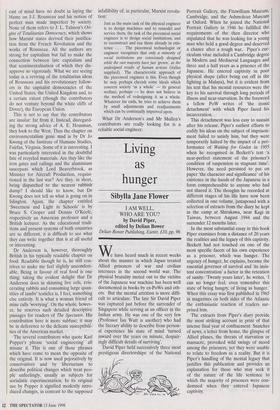Living as hunger
Sibylla Jane Flower
I AM WELL, WHO ARE YOU? by David Piper, edited by Delian Bower
Delian Bower Publishing Exeter, i10, pp. 96
We have heard much in recent weeks about the manner in which Japan treated Allied prisoners of war and civilian internees in the second world war. The physical brutality meted out to the victims of the Japanese war machine has been well documented in books by ex-PoWs and oth- ers. But the mental attrition is more diffi- cult to articulate. The late Sir David Piper was captured just before the surrender of Singapore while serving as an officer in the Indian army. He was one of the very few (Professor Ian Watt is another) who had the literary ability to describe from person- al experience his state of mind 'turned inward over the years on minute, despair- ingly difficult details of surviving'.
David Piper held successively three most prestigious directorships: of the National Portrait Gallery, the Fitzwilliam Museum, Cambridge, and the Ashmolean Museum at Oxford. When he joined the National Portrait Gallery in 1946 he fulfilled the requirements of the then director who stipulated that he was looking for a young man who held a good degree and deserved a chance after a rough war. Piper's cur- riculum vitae included a Cambridge degree in Modern and Mediaeval Languages and three and a half years as a prisoner of the Japanese. He entered captivity in poor physical shape (after being cut off in the fighting in Malaya), but it is evident from his text that his mental resources were the key to his survival through long periods of illness and near-starvation. In the foreword a fellow PoW writes of 'the ironic detachment' with which Piper faced his incarceration.
This detachment was less easy to sustain after his release. Piper's earliest efforts to codify his ideas on the subject of imprison- ment failed to satisfy him, but they were temporarily halted by the impact of a per- formance of Waiting for Godot in 1955 when he recognised in Beckett's text 'a near-perfect statement of the prisoner's condition of suspension in stagnant time'. However, the need persisted to put on paper 'the character and significance' of his existence in the hands of the Japanese in a form comprehensible to anyone who had not shared it. The thoughts he recorded at different stages of his life have now been collected in one volume, juxtaposed with a selection of extracts from the diary he kept in the camp at Shirakawa, near Kagi in Taiwan, between August 1944 and the surrender 12 months later.
In the most substantial essay in this book Piper examines from a distance of 20 years the realities and the legacy of this captivity. Beckett had not touched on one of the most specific facets of his own experience as a prisoner, which was hunger. The urgency of hunger, he explains, became the essential governor of survival and 'its insis- tent concentration' a factor in the retention of sanity. 'Twenty years later', he writes, 'I can no longer feel, even remember this state of being hungry, of living as hunger.' When this essay was first published in 1965 in magazines on both sides of the Atlantic the enthusiastic reaction of readers sur- prised him.
The extracts from Piper's diary provide the most striking account in print of that intense final year of confinement. Snatches of news, a letter from home, the glimpse of Allied planes, the threats of starvation or massacre, provoked wild swings of mood among the prisoners, yet they were unable to relate to freedom as a reality. But it is Piper's handling of the mental legacy that justifies this publication and provides an explanation for those who may seek it of the nature of the life sentence to which the majority of prisoners were con- demned when they entered Japanese captivity.


































































 Previous page
Previous page